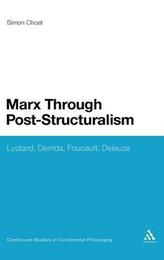
|
Marx Through Post-Structuralism: Lyotard, Derrida, Foucault, Deleuze
Hardback
Main Details
Description
Marx Through Post-Structuralism presents a thorough critical examination of the readings of Marx given by four post-structuralist thinkers, all key figures in Continental philosophy: Jean-Francois Lyotard, Jacques Derrida, Michel Foucault, and Gilles Deleuze. Arguing that both Marx and the post-structuralists seek to produce a genuinely materialist philosophy, the author aims to develop a better understanding of both Marx and post-structuralism and in so doing to reflect on the possibilities and problems for materialist philosophy more broadly. Against the common assumption that post-structuralism begins with a rejection of Marx, Choat argues that Marx has been a key influence on post-structuralist thought and that each of the four thinkers examined affirms Marx's contemporary significance. By looking at how these thinkers have read Marx - analysing their direct comments, unspoken uses, and implicit criticisms - the book demonstrates that there is a distinct and original post-structuralist approach to Marx that allows us to read him in a new light.
Author Biography
Simon Choat is Senior Lecturer in Politics at Kingston University, London, UK.
Reviews"Written with clarity, wit and elegance, Marx through Poststructuralism takes us on an analytically robust journey through poststructuralism's encounters with Marx. Choat comes to the perhaps surprising, but wonderfully productive, conclusion that that they all share the ambition of a genuinely materialist philosophy. This allows him to offer readers the gift of a practical, engaged Marxism after poststructuralism: as a renewed critical theory of the present. Anyone still puzzled by the often elusive relationship between Marx and his poststructuralist critics will benefit enormously from reading this accessible yet sophisticated book." - Diana Coole, Professor of Political and Social Theory, Birkbeck University of London, UK
|